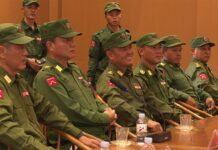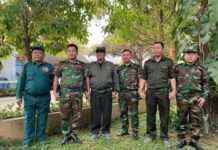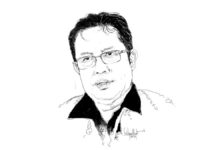It is now becoming quite clear that the 12 Ethnic Armed Organizations (EAOs), invited by United Wa State Army (UWSA) will be just a meeting between members of Nationwide Ceasefire Coordination Team (NCCT) and groups not participating in negotiation directly with UPWC. According to Gen Gun Maw, deputy chief of staff of Kachin Independence Army (KIA), it is a UWSA called conference and not the NCCT held meeting. The meeting scheduled to take place in Panghsang, from 1 to 3 May will discuss about how to go about with the peace process and evaluate the whole situation, not to decide on the Nationwide Ceasefire Agreement (NCA) fifth draft, agreed text, on 31 March.
Non-NCCT members, are the UWSA, the Mongla group and Shan State Army-South (SSA-S), and groups that the government refuses to acknowledge as participants in the nationwide ceasefire process are Arakan Army (AA) and the Kokang‘s Myanmar National Democratic Alliance Army (MNDAA). Both parties, including TNLA, have been involved in heavy fighting with the Burma Army in northern Shan State in recent months.
In this sense, the NCCT called meeting, involving all members still need to take place, so that EAO leaders could decide upon the fate of NCA draft, which would either lead to ratifying it with or without alteration, from the part of the ethnic leaders, or call another round of discussion between Union Peace-making Work Committee (UPWC) and NCCT to finalize the latest draft, should there be additional clauses, from the ethnic point of view. Either way, the EAOs need to gather and talk about the latest draft among themselves first and foremost.
The EAO leaders past meetings were held in Kachin Independence Organization (KIO) capital Laiza and Karen National Union (KNU) controlled Lawkhila, with the military’s tacit knowledge and regime’s endorsement. However, the venue of the upcoming meeting is still not decided, at this writing.
Since logistics is the most important factor to hold such meeting, involving EAOs spreading all over the country, this has to be in place or arranged, so that it could materialized. The past meetings were made possible, due to the regime’s endorsement and help, regarding transportation of the ethnic leaders to the meeting destination. During that period, the relationship between the Tatmadaw and the EAOs were quite good, if not excellent, and it had yielded to the regime’s desire. But these days, the relationship is worsening, especially with the MNDAA, KIA, Ta’ang National Liberation Army (TNLA) and AA, with offensives and daily armed clashes going on in northern Shan State and Kachin State. Apart from that, the military has openly voiced its displeasure for the invitation of MNDAA, TNLA and AA by the UWSA, which the regime doesn’t acknowledge as its negotiation partners. It even issued warning, invoking paragraph 17/1, association with illegal organizations act, and threatening to arrest those who might be involved. This means, it could arrest all EAO members and those who support them anytime, when they pass through the military controlled areas. And this means, it could block the movement of the ethnic leaders and could sabotage the meeting, whenever it chooses to do so.
Even though the up-coming Panhgsang meeting will be able to be convened, presumably with the participation of MNDAA, TNLA and AA, due to the favorable geographical location of the Wa headquarters, other locations like Laiza and Lawkhila will become problematic to reach, which have to make use of Tatmadaw controlled routes, without its willingness to endorse the free passage for all EAO leaders.
As such, the regime and as well, the military should view the peace process as a whole package for the betterment of the country, of which the EAOs meeting is also part and parcel of the whole undertaking; and allows smooth logistics flow to make the NCA deliberation of the ethnic leaders possible.
And given that the Thein Sein regime’s insistence and eagerness to proceed by its tightly scheduled plan, to start political dialogue before the general elections, slated to be held in November, there is no time to lose, from the part of the government. It will certainly be an embarrassment, if the military were to lay stones on the road to peace process for any reason, whatsoever.
Having said that, the military should now rethink its rigid posture, abandon its territorial gain offensives and opt for cooperation, especially where the forth-coming Ethnic Leaders’ Summit is concerned.
The contributor is ex-General Secretary of the dormant Shan Democratic Union (SDU) — Editor
















Leave a Comments